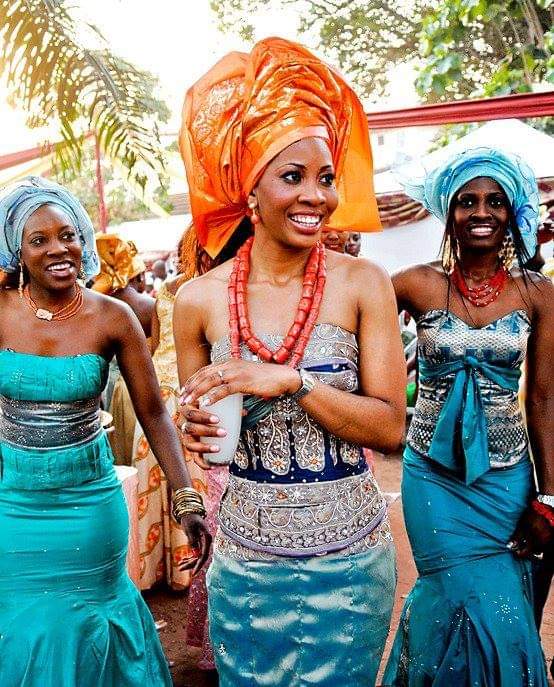Igbo bride being accompanied by her bridesmaids and holding glass of palm wine whilst searching for the groom (husband to be) to give him to drink and drop money inside it, during a traditional marriage ceremony (IGBA-NKWU) at Aba in Abia State, Nigeria. Within the Igbo cultural set-up, there are different stages and processes that are undergone before a marriage is said to be fully contracted. These stages and processes usually differ from community to community; however, the Igba-Nkwu is generally accepted to be the last of them all, since it is most often at this point that the payment of the bride-price is completed. Furthermore, it is within th ecelebration also that the bride publicly declares that she has accepted her suitor to be her lawful husband through a symbolic give and take of palm-wine. When handed the cup of wine by her father, the bride usually goes in search of her suitor and on finding him gives him the drink, who would in turn consume it; a sign of readiness to share life together at the most intimate level. It is more significantly a sign of bonding and the beginning of a covenant.
At the moment this symbolic gesture takes place, traditional marriage is said to be completed, which entails that such marriage has been certified. At this point also,nullification becomes a herculean task. The acceptance of the palm-wine by the groom signifies acceptance of the bride into his family; and the giving out of wine by the brides family ipso facto signifies the giving out of the bride from her family.Thus the public giving and receiving of wine is a symbolic expression of a marital contract, not only between the couples but between their families and communities;since among the Igbos, marriage can never be contracted individually but communally. This would account for the fact that individuals from communities that have close ancestral history or two communities in serious dispute do not contract marriage within the Igbo society.For the Igbos, the Igba-Nkwu therefore is a sine qua non for the acknowledgement of a marital union between two individuals; whereas for Christians, a marriage celebration witnessed by an official minister on behalf of the church and blessed by him within the context of the liturgy is a sine qua non for the acknowledgement and certification of a marital union. Consequently, Igbo Christians usually seek ways of unifying these two requisites since they are originally Igbos and originally Christians simultaneously.
The Rites and Essential Elements of Igba-Nkwu
At the Igba-Nkwu proper, the groom`s family is expected to pay all demanded of them in the bride price list before they marry the bride. The bride price requisites might range from jewelries to clothing, cosmetics, foodstuff, household utensils etc.In addition to these requirements from the brides immediate family; groups from
the brides community like her age grade, women married into her community,kinsmen and women would also make their legitimate demands and requirements known to their prospective in-laws, which would as well be fulfilled before or at the Igba-Nkwu ceremony. When all these are accomplished, then the atmosphere for the Igba-Nkwu would be filled with a mood that is festive, because the host or the brides community would by the fact of their in-laws meeting these demands,realize that such suitor would be capable of taking good care of their daughter materially if handed over to him; as well as an indication that his is truly interested in their daughter.At the beginning of the Igba-Nkwu ceremony, the father of the bride, admonishes her publicly on what is demanded of a good wife and mother. Afterwards, he gives her his blessing and then hands a cup of palm-wine to her and instructs her to search for the exact man that has asked for her hand in marriage among the peoplegathered and seated in his compound. The bride then carries the wine, and whenfortunately she discovers her suitor, she gives him the wine and if he drinks it, themarriage has ipso facto been contracted , for if the groom gives the wine to another male present or refuses to finish the quantity put for him in the local cup, then thereis a potential problem; however if he finishes it, then everybody present would be agog with smiles.
Other additional rituals have over the years been introduced and made part of Igba-Nkwu to make the ceremony more interesting; however the handing over of thedaughter to his in-laws and the drinking of the wine by the suitor are the crux or major points of the Igba-Nkwu ceremony. Ogbaru captures the scenario of Igba-Nkwu ceremony in the following words:
When the day for the marriage reaches, there is festivity everywhere. The
grooms family brings along with them palm
-wine of about seven kegs and two big calabash, expensive local perfume, snuff, pomade, traditional eye lash. Theywould usually invite their relations and friends to accompany them to the familyof their prospective in-law. The parents of the bride would on their part, invitetheir neighbours and prepare things that would be used to wait on their guest,ensuring that everybody eats to his or her fill.
Accordingly, we realize that the fundamental aspect of every Igba-Nkwu ceremonyis that of wine-carrying, which involves the giving of the palm-wine by the father of the bride to the bride to go in search of her prospective husband and hand over the wine; which when consumed by the suitor validates and certifies the union.The use of palm-wine is indispensable in any Igba-Nkwu ceremony, for the Igbos believe that since palm tree absorbs water from the earth and goes up to form palm-wine above, it is therefore a sort of bond for elements and spirits up in the sky andcreatures here on earth. The regular use of palm-wine for libation among the Igbosis consequential to the belief that palm-wine links the sky and earth spirits together.Considering this therefore, any move to inculturate the Igba-Nkwu into theChristian liturgy must put into consideration this fact and seek ways of usurping it.
Original Facebook Post URL: Click Here

